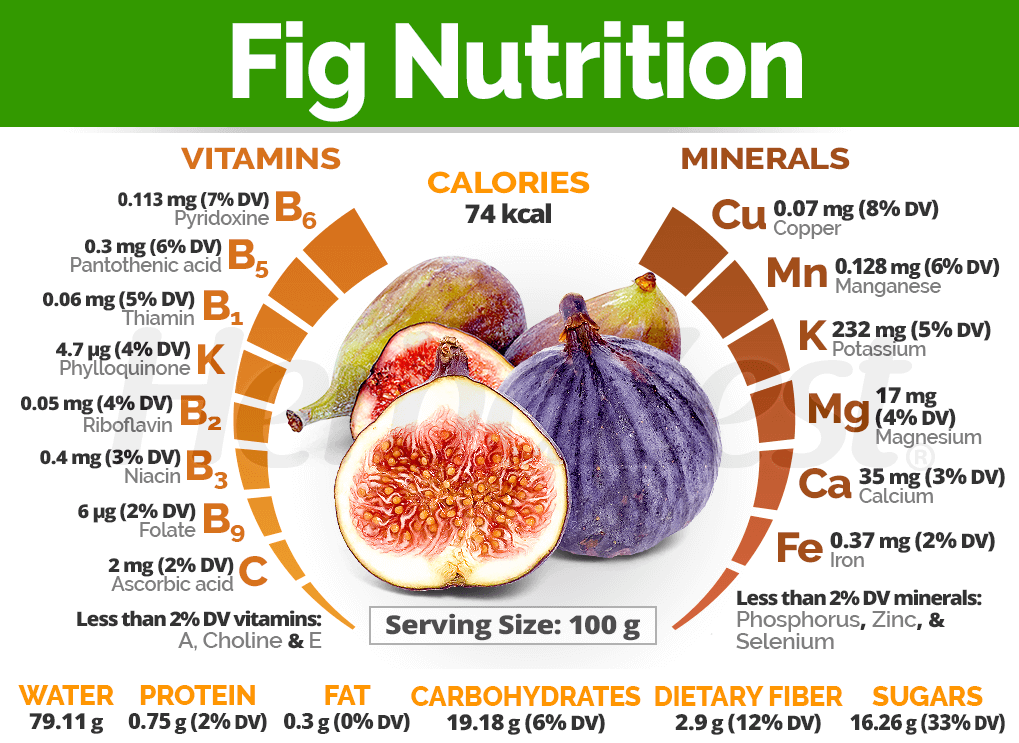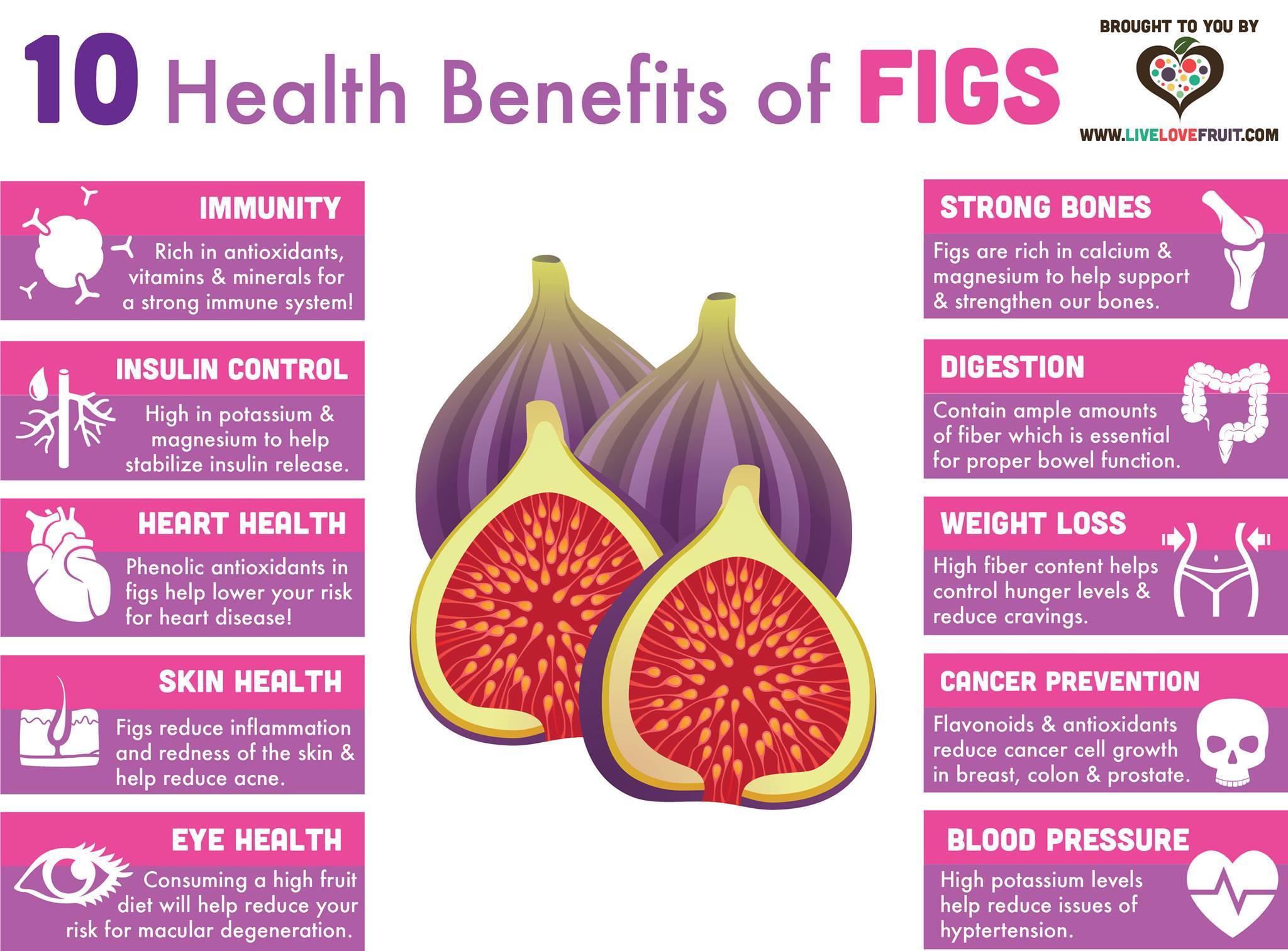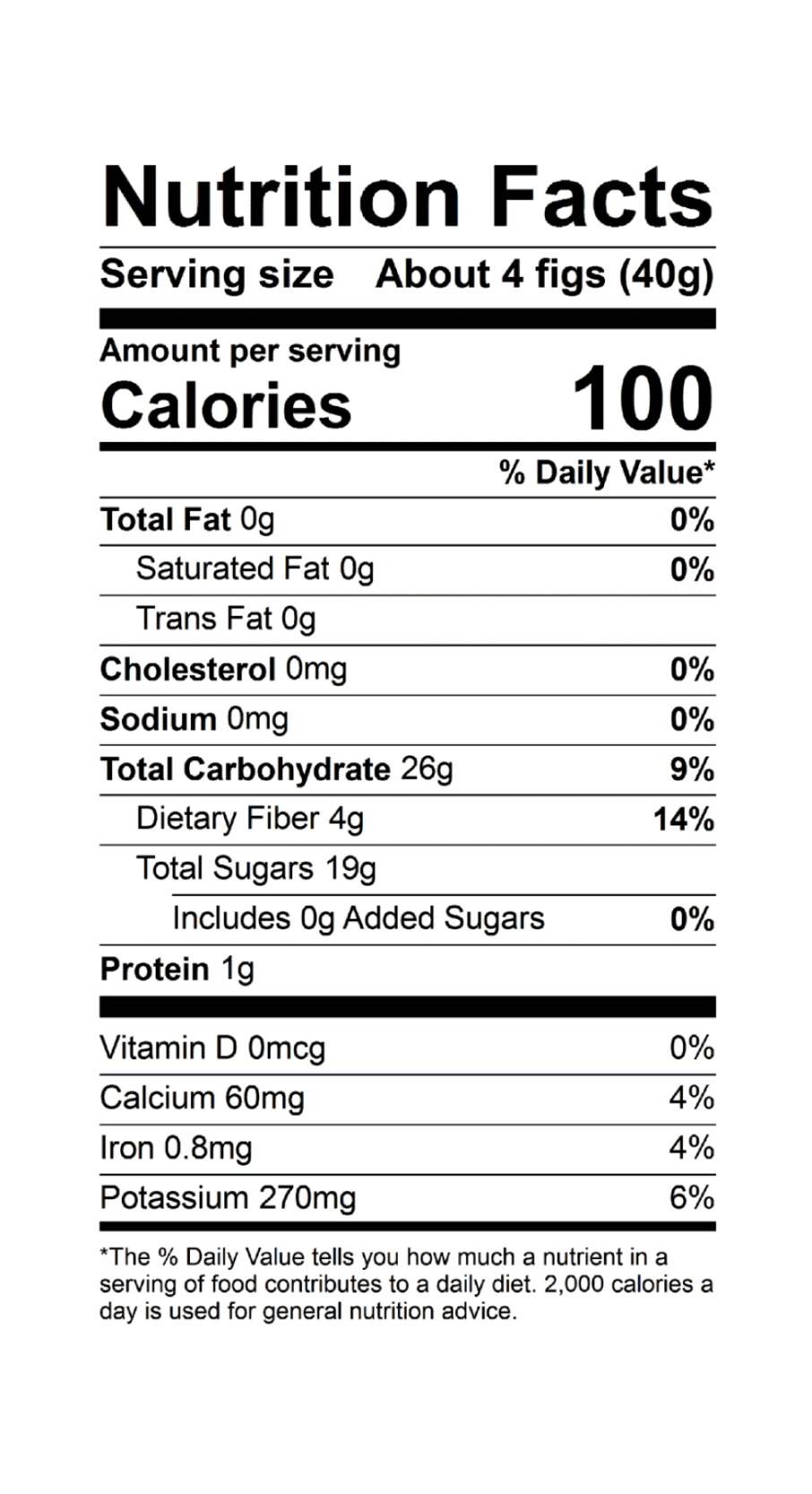Figs are rich in fiber, vitamins, and minerals. They support digestive health and offer antioxidant properties.
Figs have been enjoyed for centuries, not just for their sweet, unique taste but also for their numerous health benefits. These small fruits pack a punch when it comes to nutritional value. Rich in dietary fiber, they aid in maintaining a healthy digestive system.
Figs also contain essential vitamins and minerals such as vitamin A, vitamin K, potassium, and magnesium. Their high antioxidant content helps combat oxidative stress and inflammation. Including figs in your diet can support heart health, improve bone density, and even regulate blood sugar levels. Whether eaten fresh or dried, figs offer a tasty and nutritious addition to any meal plan.

Credit: www.fruitsinfo.com
Introduction To Figs
Figs are small, sweet fruits that grow on the Ficus tree. They are packed with nutrients and have been enjoyed for thousands of years. Figs come in various colors and shapes, making them a versatile fruit. Let's explore their history, origins, and popular varieties.
History And Origins
Figs are one of the oldest cultivated fruits. Their history dates back to ancient times. They were first grown in the Middle East and Mediterranean regions. Ancient civilizations like the Egyptians, Greeks, and Romans valued figs highly. They used them in food, medicine, and rituals.
The fig tree, known scientifically as Ficus carica, thrives in warm climates. It spreads easily, making it a staple in many cultures. Today, figs are grown in many parts of the world, including the United States, Turkey, and Spain.
Popular Varieties
Figs come in many varieties, each with unique flavors and textures. Here are some popular types:
- Black Mission Figs: These figs are dark purple to black in color. They have a sweet, earthy taste.
- Calimyrna Figs: Known for their golden skin and nutty flavor. They are often dried for longer shelf life.
- Kadota Figs: These figs are green and have a less sweet taste. They are commonly used in baking and cooking.
- Adriatic Figs: Light green to yellow, with a sweet and slightly tangy flavor. Great for eating fresh or dried.
| Variety | Color | Flavor | Uses |
|---|---|---|---|
| Black Mission | Dark Purple/Black | Sweet, Earthy | Fresh, Dried, Cooking |
| Calimyrna | Golden | Nutty | Dried, Baking |
| Kadota | Green | Less Sweet | Baking, Cooking |
| Adriatic | Light Green/Yellow | Sweet, Tangy | Fresh, Dried |
Nutritional Profile
Figs are an ancient fruit packed with essential nutrients. They provide numerous health benefits. This section delves into their nutritional profile, highlighting key vitamins, minerals, and caloric content.
Vitamins And Minerals
Figs are rich in vitamins and minerals essential for health. They contain:
- Vitamin A - Important for vision and immune function.
- Vitamin C - Boosts the immune system and skin health.
- Vitamin K - Crucial for blood clotting and bone health.
- Potassium - Helps regulate blood pressure.
- Calcium - Essential for strong bones and teeth.
- Magnesium - Supports muscle and nerve function.
- Iron - Necessary for blood production and oxygen transport.
These nutrients make figs a powerhouse of health benefits. Including them in your diet can improve overall well-being.
Caloric Content
Figs provide energy with their balanced caloric content. They are low in calories, making them an ideal snack.
| Nutrient | Amount per 100g |
|---|---|
| Calories | 74 kcal |
| Carbohydrates | 19 g |
| Protein | 0.75 g |
| Fat | 0.3 g |
| Fiber | 2.9 g |
Figs are low in fats and proteins but high in carbohydrates. This makes them a quick source of energy. The dietary fiber content aids digestion and keeps you feeling full.
Antioxidant Properties
Figs are rich in antioxidants. These powerful compounds protect your body from harmful free radicals. Eating figs can promote overall health and wellness.
Fighting Free Radicals
Free radicals are unstable molecules. They can damage cells. This damage may lead to chronic diseases. Figs contain high levels of antioxidants. These antioxidants help neutralize free radicals. This helps reduce the risk of diseases.
| Type of Antioxidant | Function |
|---|---|
| Polyphenols | Neutralize free radicals |
| Flavonoids | Protect cells |
Boosting Immunity
Antioxidants in figs help boost your immune system. A strong immune system defends your body against infections. Figs contain vitamins like Vitamin C and E. These vitamins strengthen your immunity.
- Vitamin C: Helps produce white blood cells.
- Vitamin E: Protects cells from damage.
Eating figs regularly can keep you healthy. They can make your immune system stronger.

Credit: livelovefruit.com
Digestive Health
Figs are a powerhouse of nutrients that benefit digestive health. They provide essential vitamins and minerals. They also offer a natural source of dietary fiber. This helps keep the digestive system in great shape.
Dietary Fiber
Figs are packed with dietary fiber. This is crucial for good digestion. Fiber helps in forming stool and promoting regular bowel movements. A diet rich in fiber can prevent constipation. One dried fig has about 1.4 grams of fiber.
| Nutrient | Amount per Dried Fig |
|---|---|
| Dietary Fiber | 1.4 grams |
Including figs in your diet helps meet daily fiber needs. This supports a healthy digestive tract.
Gut Health Benefits
Figs contain prebiotics. These feed the good bacteria in your gut. A balanced gut microbiome is essential for overall health. Prebiotics help the gut bacteria thrive.
- Supports healthy gut bacteria
- Improves nutrient absorption
- Boosts the immune system
Figs also have natural enzymes like ficin. These help break down food and aid digestion. Ficin can improve nutrient absorption. This makes figs a valuable addition to your diet.
Heart Health
Figs are a powerhouse of nutrients. They offer several benefits for heart health. Rich in antioxidants, vitamins, and minerals, figs support a healthy heart.
Cholesterol Reduction
Figs help lower cholesterol levels. They contain soluble fiber called pectin. Pectin binds with cholesterol and removes it from the body. This process helps reduce bad cholesterol levels.
Additionally, figs contain phytosterols. These are plant compounds that block cholesterol absorption in the intestines. Consuming figs daily can help maintain healthy cholesterol levels.
Read More: Are Bananas Good for Acid Reflux
Blood Pressure Management
High blood pressure can strain the heart. Figs are rich in potassium and low in sodium. This balance is crucial for maintaining healthy blood pressure.
Potassium helps counteract the effects of sodium. It relaxes blood vessels and reduces pressure on the heart. Eating figs can help control blood pressure naturally.
| Nutrient | Role in Heart Health |
|---|---|
| Potassium | Regulates blood pressure |
| Pectin | Lowers cholesterol levels |
| Phytosterols | Blocks cholesterol absorption |
Incorporate figs into your diet for a healthier heart. Enjoy them fresh or dried. Your heart will thank you!
Bone Health
Figs are not only delicious but also packed with numerous nutritional benefits. Among these, figs play a significant role in promoting bone health. This is due to their rich content of essential minerals and vitamins.
Calcium And Magnesium
Figs are a great source of calcium and magnesium. Both minerals are crucial for maintaining strong bones. Calcium helps build and maintain bone structure. Magnesium aids in the absorption of calcium. This makes figs an excellent choice for boosting bone health.
Here's a quick look at the calcium and magnesium content in figs:
| Mineral | Amount per 100g |
|---|---|
| Calcium | 35 mg |
| Magnesium | 17 mg |
Preventing Osteoporosis
Osteoporosis is a condition where bones become weak and brittle. Including figs in your diet can help prevent this condition. Figs contain vitamin K, which is vital for bone health. Vitamin K helps in the formation of bone proteins.
Figs also have phosphorus, which works with calcium to strengthen bones. Regular consumption of figs can thus be a natural way to maintain bone density and prevent osteoporosis.
- Rich in calcium and magnesium
- Contains vitamin K
- Good source of phosphorus
Adding figs to your diet is simple. Eat them fresh or dried. They can also be added to salads, cereals, and smoothies.
Weight Management
Figs are not only delicious but also packed with nutrients. They are a great choice for those looking to manage their weight. This section delves into how figs can assist in weight management.
Low-calorie Snack
Figs are a low-calorie snack. A single fig contains only about 30 calories. This makes them an ideal choice for those counting calories. You can enjoy figs without worrying about weight gain. They also offer a sweet taste, satisfying sugar cravings.
Satiety And Hunger Control
Figs are rich in dietary fiber, which helps in hunger control. Fiber makes you feel full, reducing the urge to eat more. A serving of figs can keep you satisfied for longer periods. This helps in reducing overall calorie intake.
| Component | Benefit |
|---|---|
| Low Calories | Promotes weight loss |
| High Fiber | Increases satiety |
Figs also contain essential nutrients like vitamins and minerals. These nutrients support overall health while aiding in weight management. They are a natural way to control hunger and manage weight effectively.
Incorporating Figs In Diet
Incorporating figs into your diet can be a delicious and nutritious choice. Figs are rich in vitamins, minerals, and antioxidants. They provide numerous health benefits. Whether you prefer fresh or dried figs, there are many ways to enjoy them. Discover how to include figs in your daily meals.
Fresh Vs Dried
Fresh figs are juicy and sweet. They are perfect for summer salads or as a snack. Fresh figs have a higher water content. They are lower in calories compared to dried figs.
Dried figs are chewy and sweet. They make a great energy-boosting snack. Dried figs have a longer shelf life. They are rich in fiber and minerals.
| Fresh Figs | Dried Figs |
|---|---|
| Higher water content | Lower water content |
| Fewer calories | More calories |
| Shorter shelf life | Longer shelf life |
| Great for salads | Great for snacks |
Delicious Recipes
Here are some tasty recipes to try:
- Fig and Goat Cheese Salad:
- Mixed greens
- Fresh figs, sliced
- Goat cheese, crumbled
- Balsamic vinaigrette
- Fig Smoothie:
- 1 cup milk (or almond milk)
- 1 banana
- 4 dried figs
- 1 tablespoon honey
- Ice cubes
- Baked Figs with Honey:
- Fresh figs, halved
- Honey
- Greek yogurt
Try these recipes and enjoy the nutritional benefits of figs. Figs can be a delicious addition to any meal.

Credit: californiafigs.com
Frequently Asked Questions
What Are The Nutritional Benefits Of Figs?
Figs are rich in fiber, which aids digestion. They contain essential vitamins like A, B, and K. Figs are also high in minerals such as potassium, magnesium, and calcium.
Are Figs Good For Weight Loss?
Yes, figs can aid in weight loss. They are low in calories and high in dietary fiber. This helps to keep you full longer.
How Do Figs Benefit Heart Health?
Figs can improve heart health. They are high in antioxidants and potassium, which help reduce blood pressure and cholesterol levels.
Can Figs Improve Digestive Health?
Yes, figs promote digestive health. They are rich in dietary fiber, which helps prevent constipation and supports a healthy gut.
Conclusion
Figs are packed with essential nutrients and offer various health benefits. They are rich in vitamins, minerals, and antioxidants. Including figs in your diet can improve digestion, support heart health, and boost immunity. Enjoy them fresh or dried for a tasty and nutritious addition to your meals.
Embrace the goodness of figs today!
